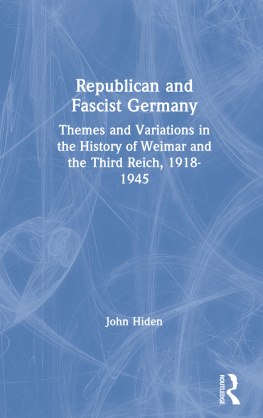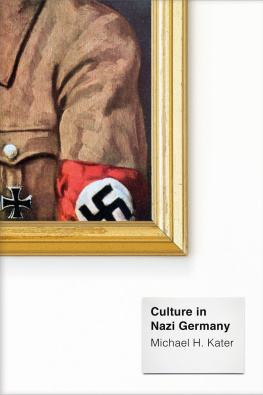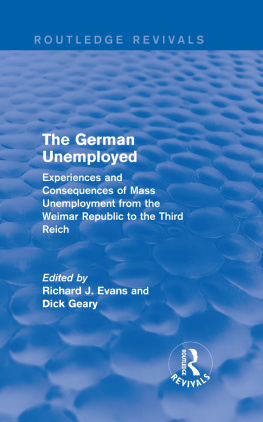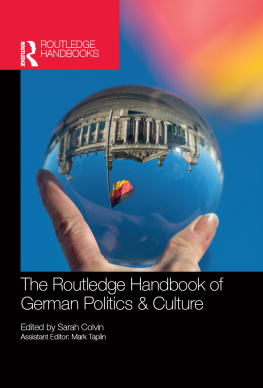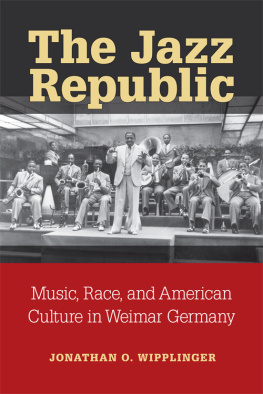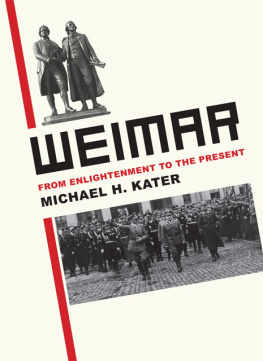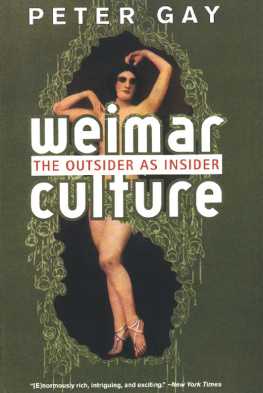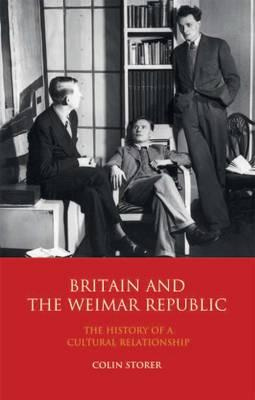It is a real pleasure to finally be able to thank all of the individuals and institutions who made the writing of this book possible. Much of the research on which this project is based was made possible by a grant from the Office of the Vice President for International Affairs at Indiana University. I count the year I spent in Berlin, Germany, in 20102011 with my family among the most rewarding and stimulating of my life. Thanks also to the Department of History, the School of Library and Information Science, and the Institute for European Studies at Indiana University for providing crucial academic and financial support during my time as a graduate student. I would also like to thank my colleagues at the School of Library and Information Management at Emporia State University who offered encouragement and advice at every step.
I would like to thank the many archivists and librarians in Germany and the United States whose assistance and expertise impacted this book in ways large and small. A special thanks as well to my research assistant, Emily Alexander, who copyedited large parts of the manuscript and greatly assisted with properly formatting the source citations. The interlibrary loan staff at Emporia State University has been particularly helpful in tracking down obscure items. My interdisciplinary interests in history and musicology were fostered dating back to my undergraduate years at the University of Texas, and I would particularly like to thank David Crew, Brian Levack, and Kevin E. Mooney without whose encouragement I likely would not have taken up these interests in the first place. A number of colleagues comments and criticisms greatly helped improve this book, especially Celia Applegate, Erin Corber, Patrick Gilner, Carl Ipsen, Stephanie Koscak, Christopher A. Molnar, Bryan Parkhurst, Pamela Potter, Mark Roseman, Julia Roos, Robert A. Schneider, Rebecca Spang, Laura Stokes, Kira Thurman, Michael Widdersheim, Jonathan O. Wipplinger, and Jonathan Yeager. Chapters of this book were presented at many academic conferences over the past several years, and I extend a special thanks to the commenters whose insights helped strengthen the books arguments. I could not have asked for better editors in Tom Stottor at I. B. Tauris and Laura Reeves at Bloomsbury Academic, whose sure hands helped guide the manuscript through all stages of the publication process. Lastly, a special thanks goes to the two anonymous reviewers for their incisive comments on the manuscript. Needless to say, any remaining shortcomings or errors are mine alone.
This book would never have seen the light of day without the love and support of my family and friends. Jennifer Fay and Enrique Davilawho I just as easily could have thanked in any of the above sectionshave read my work and offered sage advice over the years. Although my parents, Paula Page and Thomas Fay, would not appear to have bestowed any of their considerable musical talents on me, they awakened in me a love of music for which I will always be grateful. I also want to thank other family members, including my sister, Kathleen Fossan, Chris Fossan, grandparents, Robert and Glynn Page, Joan Squires, Alexander Gemignani, Carolann Page, and father-in-law Eggehard Rother for their unstinting support over the years. I have been exceedingly fortunate to have not one but many best friends, and would particularly like to thank Matt Begley, Danny Droubi, Ivan Neel, Rick Lockton, and Ezana Tesfaye for their friendship over the years. Finally, my wife Sonja and our children, Madeleine and Maxim, have borne the brunt of the travel, relocation, and time away from home that the writing of this book required. I hope my dedicating it to them serves as some small token of appreciation for all that they have sacrificed and endured.
A lightly revised version of titled Conservative Music Criticism, the Inflation and Concert Life in Weimar Germany, 19191924 appeared in Cultural History, 6 (2) (2017): 141163. My thanks to both journals for permission to reprint.
Ist das Bach? one German asks his fellow SS officer, as notes from the composers Partita in A Minor punctuate the sound of gunshots during the clearing of the Krakw Ghetto in one of the more memorable scenes in Steven Spielbergs film Schindlers List. It was not the first time such a cultural trope has been used to depict Nazi perpetrators on screen, nor would it be the last. In Alfred Hitchcocks 1944 classic Lifeboat, a captured German U-boat officer seduces his captors with Schubert Lieder before murdering one of their number. Frank Piersons film Conspiracy likewise sees Adolf Eichmann and Reinhard Heydrich unwind over cognac and Schuberts String Quintet in C Major after having casually discussed the mass murder of Europes Jews at the notorious Wannsee Conference. As the foregoing illustrates, the relationship between good and bad Germany has found wide-ranging expression in popular culture, from contemporary film and literature to historical nonfiction.
This was not always so. Prior to the era of the world wars, nineteenth-century observers often spoke glowingly of a German Sonderweg characterized by literary, philosophical, and, above all, musical dynamism and creation. Efforts geared toward uncovering a peculiar German aptitude for musical creation and Germans in general as a peoples of music seized upon the very fragmentation long held responsible for the development of those structurespolitical backwardness and a sclerotic associational life, to name only twowhich made it particularly susceptible to Nazism. For many, the answer to the question posed earlier was clear: the German turn toward Nazism occurred not despite Beethoven and Bach but because of them.
The end of the last century saw the appearance of pathbreaking scholarship that demonstrated the complicity of German culture and its defenders with the rise of Nazism. Historians such as Georg Bollenbeck and Michael Meyer heavily documented the entrenched nationalism and anti-Semitism within conservative circles and the backlash to modernist innovations so characteristic of Weimar.
From the various contributions within the influential conservative music periodicals Zeitschrift fr Musik, Neue Musik-Zeitung, and Allgemeine Musik-Zeitung to the writings of influential musicologists, journalists, and composers such as Alfred Heuss, Hans Hinkel, and Hans Pfitzner, to name only three, we can indeed often trace a correspondence between cultural conservatives on one hand and increasingly hostile views toward Jews, foreigners, atonalists, and the Republic itself on the other. For this reason, the convergences between Weimar and Third Reich within the pages of the conservative musical press have often been seen in rather straightforward terms whereby conservative-minded individuals and institutions have functioned as a kind of cultural anteroom in which reactionary fears, if not proto-Nazi ideas themselves, first germinated and later flourished. To be sure, Weimar Germany was not the only place where such cultural appropriation took place, nor musical conservatives the only ones who usurped culture for their own political and social ends. Fascinating studies of eighteenth- and nineteenth-century German masters have revealed the lengths to which various groupings went in their efforts to align past composers with their own ideological programs. The previous century, for example, had seen conservatives advertise Beethovens vlkisch-nationalist credentials, while socialists emphasized Handels revolutionary and anti-aristocratic tendencies.


